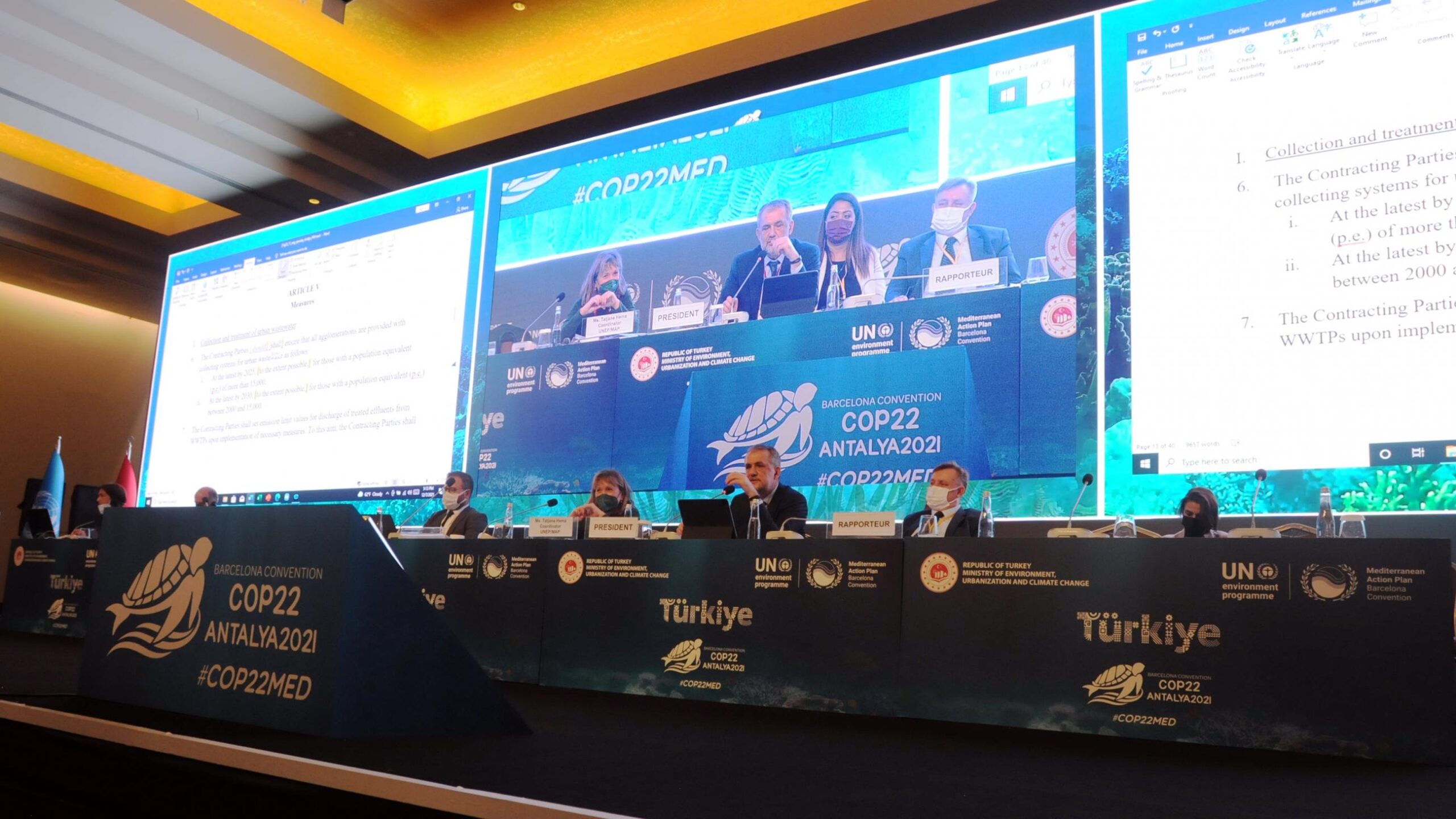
Photo © UNEP/MAP
At the 22nd Meeting of the Contracting Parties to the Convention for the Protection of the Marine Environment and the Coastal Region of the Mediterranean (the Barcelona Convention) and its Protocols (COP 22), Mediterranean governments adopted the Antalya Ministerial Declaration and 19 Decisions, committing to achieve a pollution-free, biodiversity rich and climate stable Mediterranean Sea. Read more about the outcomes of COP22 here.
It is a pity that remote connection and inclusion of MAP Partners, like MIO-ECSDE, that could not travel due to the on-going pandemic, was not made possible by the organisers. But we managed to follow from a distance thanks to the few NGOs that were present.
The title of the Ministerial Session “Towards a Blue Mediterranean: Leaving a Pollution-Free Legacy, Protecting Biodiversity and Sustaining Climate Stability” that took place on the 9th of December, was a profound one that naturally raised expectations. Although there is no doubt that progress has been achieved by UNEP/MAP – despite the difficulties that the region faces at so many levels – the level of political commitment of the “Mediterranean COP” did not quite meet the mark that civil society hoped for.
There is no longer room for further disappointment. Countries and institutions need to step up, use the existing knowledge and tools (soft and hard), reform their institutions and services, mobilize the available considerable funds not yet accessed, and accelerate the transition that is extremely slow and late in coming.
The collective concerns of MIO-ECSDE, RAED (Arab Network for Environment and Development), eco-union, and other NGOs of the region were voiced during the Ministerial segment – but perhaps upon deaf ears. Delivered by Dr. Emad Adly, General Coordinator of RAED, the statement called upon the Contracting Parties to:
- Increase the ambition of the Contracting Parties so that the Mediterranean region, one of the most vulnerable and affected regions by climate change and biodiversity losses, becomes a global leader in stopping biodiversity losses by 2030 and in the ecological transition to climate-neutrality by 2050. Effective protection to conserve at least 30 per cent of the Mediterranean Sea by 2030, should be achieved.
- Develop operational coordination and cooperation mechanisms with major regional and global environmental agreements, such as the Paris Agreement or the Convention on Biological Diversity, to implement them in the riparian countries in the shortest time capitalizing also on the Barcelona Convention mechanisms.
- Follow-up on the submission to the IMO MEPC 78 to designate the Mediterranean Sea an emission control area for Sulphur (SECA) with full entry into force on time (we would have preferred the earlier date of 2024 and not 2025). To maximize achievable health benefits for Mediterranean citizens we also call for the designation of an emission control area for nitrogen oxide emissions (NECA) as well, with full entry into force by 2025.
- Enhance the implementation, visibility, and impact of the Mediterranean Strategy for Sustainable Development (MSSD) 2016-2025, to take full benefits of its achievements and address its shortcomings, following the recommendations of the mid-term assessment of the MSSD.
- Ensure open, reliable and easy access to national data and information provided by Contracting Parties in the framework of the Barcelona Convention, to facilitate monitoring, participation and scrutiny by civil society, academia and external observers.
- Recognize the role and capitalize on the efforts of NGOs and CSOs and provide technical and financial means, in particular for those from the South, to guarantee adequate and fair participation in the policy and decision-making processes related to the Barcelona Convention.
It was also reiterated how deeply concerned Mediterranean NGOs are about the environmental implications of deep-sea mining and off-shore oil and gas extraction in the Mediterranean Sea, given the potential irreversible effects on fragile and vulnerable marine ecosystems and the contradiction to global efforts towards climate-neutrality by 2050.
All of the above require higher political commitment and full involvement and support from the public. This can be obtained through accession to the Convention on Access to Information, Public Participation in Decision-making and Access to Justice in Environmental Matters (Aarhus Convention), and enhanced awareness and education by implementing the Mediterranean Strategy on Education for Sustainable Development and its Action Plan.
The impression is that the role of NGOs is undermined. NGOs contribute to the transposition of the outcomes of decision-making bodies such as the Barcelona Convention to the national level. So, they are valuable allies for the implementation of the objectives of the Convention. With over 350 member organizations between MIO-ECSDE and RAED – a truly powerful force of millions of citizens that these NGOs collectively reach out to – they are critical in the efforts of building back a greener, inclusive and gender-responsive recovery, following the impact of the COVID-19 pandemic.
At the closing plenary the Contracting Parties accepted the offer to host COP23 in Slovenia (2023) and COP24 in Egypt (2025).
Read here the full statement of Mediterranean NGOs
Read in French here